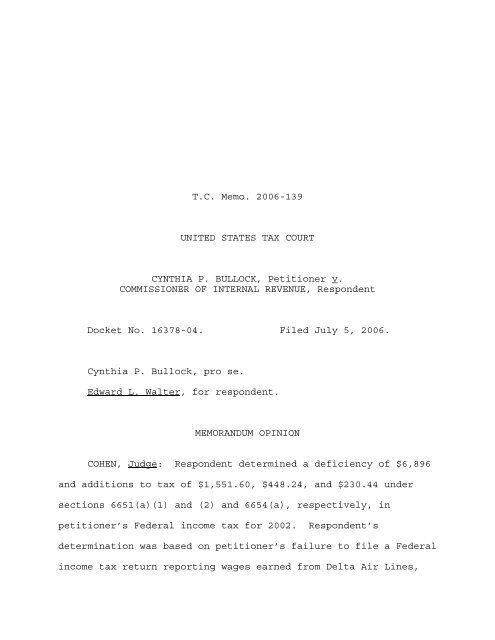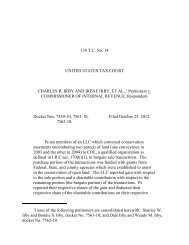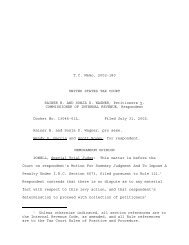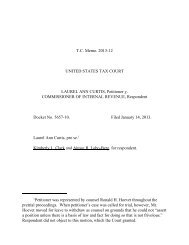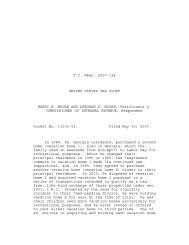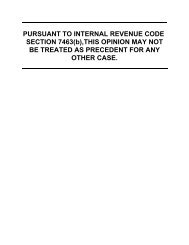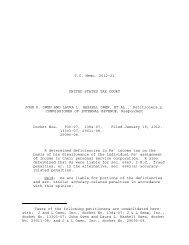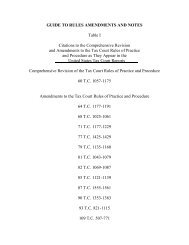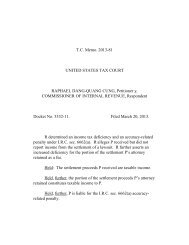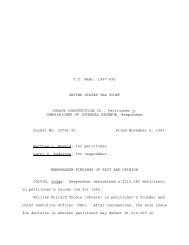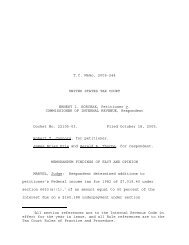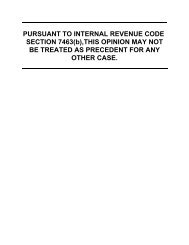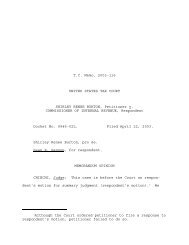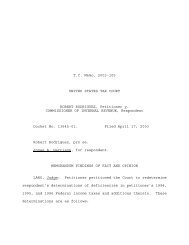T.C. Memo. 2006-139 UNITED STATES TAX ... - U.S. Tax Court
T.C. Memo. 2006-139 UNITED STATES TAX ... - U.S. Tax Court
T.C. Memo. 2006-139 UNITED STATES TAX ... - U.S. Tax Court
Create successful ePaper yourself
Turn your PDF publications into a flip-book with our unique Google optimized e-Paper software.
T.C. <strong>Memo</strong>. <strong>2006</strong>-<strong>139</strong><br />
<strong>UNITED</strong> <strong>STATES</strong> <strong>TAX</strong> COURT<br />
CYNTHIA P. BULLOCK, Petitioner v.<br />
COMMISSIONER OF INTERNAL REVENUE, Respondent<br />
Docket No. 16378-04. Filed July 5, <strong>2006</strong>.<br />
Cynthia P. Bullock, pro se.<br />
Edward L. Walter, for respondent.<br />
MEMORANDUM OPINION<br />
COHEN, Judge: Respondent determined a deficiency of $6,896<br />
and additions to tax of $1,551.60, $448.24, and $230.44 under<br />
sections 6651(a)(1) and (2) and 6654(a), respectively, in<br />
petitioner’s Federal income tax for 2002. Respondent’s<br />
determination was based on petitioner’s failure to file a Federal<br />
income tax return reporting wages earned from Delta Air Lines,
- 2 -<br />
Inc. Because this is the third case in which petitioner raised<br />
the same or similar arguments, and because she has had prior<br />
warning, the <strong>Court</strong>, on its own motion, is imposing a penalty of<br />
$7,500 under section 6673. Unless otherwise indicated, all<br />
section references are to the Internal Revenue Code in effect for<br />
the year in issue, and all Rule references are to the <strong>Tax</strong> <strong>Court</strong><br />
Rules of Practice and Procedure.<br />
Background<br />
Petitioner resided in Florence, Kentucky, at the time that<br />
she filed her petition. In 1999, she and her spouse filed a<br />
petition in this <strong>Court</strong>, docket No. 15381-99, in which they<br />
challenged deficiencies for 1996 and 1997. Petitioner and her<br />
spouse moved to withdraw that petition and failed to amend their<br />
petition after having been given an opportunity to do so. The<br />
<strong>Court</strong> denied the motion to withdraw and granted respondent’s<br />
motion to dismiss for failure to state a claim. On appeal, the<br />
<strong>Court</strong> of Appeals stated, in part:<br />
even after being given an opportunity to amend their<br />
petition, they raised only frivolous arguments, such as<br />
claiming that their income was not “wages” or that<br />
their wages were not taxable income, which have<br />
repeatedly been rejected. See Wilcox v. Comm’r, 848<br />
F.2d 1007, 1008 (9th Cir. 1988); Perkins v. Comm’r, 746<br />
F.2d 1187, 1188 (6th Cir. 1984). [Bullock v.<br />
Commissioner, 21 Fed. Appx. 272, 273 (6th Cir. 2001).]<br />
In 2004, petitioner filed a petition, docket No. 1530-04,<br />
challenging a notice of deficiency sent to her for 2000.<br />
Respondent filed a motion to dismiss for failure to state a claim
- 3 -<br />
upon which relief can be granted. Petitioner filed an amended<br />
petition repeating frivolous arguments set forth in the petition.<br />
Respondent’s motion to dismiss was granted by order entered<br />
June 29, 2004, which contained the following:<br />
Section 6673(a)(1) authorizes the <strong>Tax</strong> <strong>Court</strong> to<br />
require a taxpayer to pay to the United States a<br />
penalty not in excess of $25,000 whenever it appears<br />
that proceedings have been instituted or maintained by<br />
the taxpayer primarily for delay or that the taxpayer’s<br />
position in such proceeding is frivolous or groundless.<br />
Although we will not impose a penalty upon petitioner<br />
pursuant to section 6673, we nevertheless will take<br />
this opportunity to admonish petitioner that the <strong>Court</strong><br />
will consider imposing such a penalty should she return<br />
to the <strong>Court</strong> and advance similar arguments in the<br />
future.<br />
The present case was filed on September 7, 2004, with<br />
respect to petitioner’s liability for 2002. Petitioner filed a<br />
frivolous petition, a frivolous motion for summary judgment, a<br />
frivolous motion to vacate the order denying the motion for<br />
summary judgment, and various other frivolous documents. The<br />
case was set for trial in Cincinnati, Ohio, on June 12, <strong>2006</strong>,<br />
pursuant to notice served January 9, <strong>2006</strong>. Petitioner failed to<br />
comply with the <strong>Court</strong>’s Rules or with the standing pretrial order<br />
served with the notice of trial. Instead, on June 1, <strong>2006</strong>,<br />
petitioner filed a frivolous motion to dismiss, requesting<br />
withdrawal of the petition. That motion was denied June 1, <strong>2006</strong>.<br />
Petitioner failed to appear for trial. Respondent appeared<br />
and filed a pretrial memorandum and a motion for judgment by<br />
default. Respondent’s moving papers included a section 6020(b)
- 4 -<br />
“Certification” that a substitute return prepared by the Internal<br />
Revenue Service satisfied the requirements of section 6651(a)(2),<br />
(3), and (g)(2).<br />
Discussion<br />
Petitioner has been on notice since at least 2001 that her<br />
arguments concerning her income and her liability for income tax<br />
are frivolous. Yet she repeats her conduct, including attempts<br />
to withdraw her petition after it has been filed. Once<br />
petitioner has invoked the jurisdiction of this <strong>Court</strong>, she may<br />
not withdraw or voluntarily dismiss her petition without entry of<br />
a decision against her. See sec. 7459(d); Estate of Ming v.<br />
Commissioner, 62 T.C. 519, 524 (1974).<br />
It is apparent that petitioner’s tactics in filing petitions<br />
in this <strong>Court</strong> are primarily for delay and that she intends to<br />
pursue only frivolous arguments. Nothing in her voluminous<br />
filings suggests any justiciable dispute with respect to the<br />
income determinations in the notice of deficiency and the<br />
appropriateness of the additions to tax. Funk v. Commissioner,<br />
123 T.C. 213 (2004). Respondent’s motion for judgment by default<br />
will be granted under Rules 123 and 149. The decision will<br />
include an award of a penalty to the United States in the amount<br />
of $7,500 under section 6673.<br />
An appropriate order and<br />
decision will be entered.


